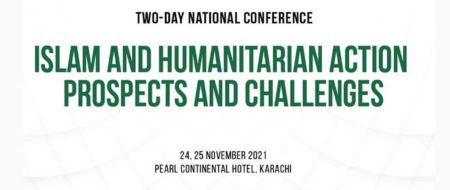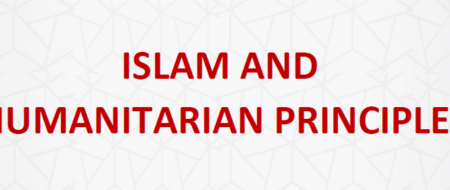Human Rights: An Islamic Perspective
Policy Perspectives, Vlm 3, No.1
Abstract
[Violation of human rights by the USA and its unlawful occupation of Iraq, the similar occupation of Kashmir by India, and the presence of US GIs in Afghanistan point to the double standards and ineffectiveness of the UN. The fact that the UN has failed to effect a realization of human rights in its own member states underscores the need for a critical study of human rights in the West, focused on the problems in their implementation, as well as the very philosophy and concept on which they are based.
In this backdrop, this paper makes an effort to understand the philosophy of human rights in Islam. It suggests a seven-fold ethical paradigm for universal application of human rights that transcends color, race, gender ethnicity and religious affiliation of the people of the world. It aims, at the same time, to provide an ethical and legal basis for realization of human rights in the context of the Muslim states.
Without delving into fine details, the paper attempts to summarize the basic human rights given by the Qur’an and Sunnah under 28 headings. The paper does not cover the total scheme of human rights in other ‘specialized’ areas such as economic, political participation, social, cultural, educational, legal, and religious rights.
The last section of the paper proposes a five-fold strategy for the gradual implementation of the human rights given by Islam at a global level. These human rights do not discriminate between human beings on the basis of ethnicity, nationality gender color or religion. A systematic educational strategy is proposed to help in achieving positive results in the process of implementing these human rights in the contemporary world. – Author]
The Current State of Human Rights
The Lawyers Committee for Human Rights, USA, arrested world attention and invited a global condemnation by exposing some of the brutal, gruesome and inhuman acts perpetrated by the USA.[1] The recent human rights abuses at individual and state level at Abu Ghuraib prison in Iraq; Guantanamo Bay, Cuba; in Qila Jangi, Afghanistan; as well as in the US detention centers in the Indian Ocean; the Island of Diego Garcia; al-Jafer prison in Jordan; in Charleston, South Carolina; and even in Kohat, Pakistan, present glaring instances of the UN’s failure in implementing its charter and conventions.
Joseph Stiglitz, the recipient of the Nobel Prize for Economics in 2001, calls these abuses a shameful act that undermines basic democratic protections. He looks at it as a trampling of human rights, international law and the Geneva Conventions, and says: “I am so horrified by what has happened in my country [USA], and what my country has done to others over the past two years that I feel I must speak out.”[2]
It is interesting that while Stiglitz, an American veteran[KAK1], has publicly condemned the USA’s violations of human rights, the Justice Department’s Office of Legal Counsel, in a memo of August 2002, advises the State Department regarding the finer points of inflicting pain without torture: “Certain acts may be cruel, inhuman or degrading but still not produce pain and suffering of the requisite intensity”[3] and may not amount to torture.
Irrespective of the legal definition of torture, humiliation, cruelty and inhumanity, the utter disregard for human rights in Iraq, Afghanistan, Palestine, Occupied Kashmir, Myanmar as well as in France and Australia,[4] by denial of cultural, religious, social, political and economic rights of the citizens, calls for a serious rethinking on the very concept of human rights in the western world.
The Western Philosophy of Human Rights
The evolution of human rights in the West is often traced back to the Magna Carta of 1215 – a contract between the Barons and the King of Great Britain – which allowed the protection of some rights to the Barons. The British Parliament passed a law in 1355 under which no one could be deprived of his life, liberty or land without following a prescribed procedure. The concept of natural rights took several centuries to evolve until its formulation in the seventeenth century. John J. Rousseau’s Social Contract, 1762, sheds ample light on the process and evolution. The American Declaration of Independence of July 12, 1776, reflects another significant effort in this direction. In 1948, after another two centuries, Europe came up with the idea of the Universal Declaration of Human Rights under the aegis of the United Nations. This was perhaps a natural consequence of the horrors the West originated and experienced in 1941–42. On December 16, 1966, certain provisions of the Declaration were incorporated in the international Convention adopted by the UN General Assembly.
The unanimous agreement of the nations who signed the Declaration and later endorsed the International Convention, however, has not resulted in a voluntary observation of these human rights by many of the players involved in state terrorism globally. The most recent example is that of the USA, a leader in state terrorism that is violating the right to sovereignty of the Iraqi and the Afghan people. Israel is another example, with 54 years of continuous violation of human rights of the Palestinians. The right to self-determination of the Kashmiris is similarly violated repeatedly by India.
The basic issue we need to consider at this point in history, perhaps, is not what human rights are allowed, but why – in the presence of one or another charter, covenant, convention or declaration – such outrageous violations of human rights keep taking place. Another crucial issue is how to realize and implement human rights in the unstable world we live in today.
The first and foremost aspect to consider, in our view, is the conceptual problem. In the West, the evolution of human rights has taken place in the context of rights of the individual as reflected in general doctrines of individualism and narcism. The political liberty of the individual was the focus. With all the philosophical and doctrinal contributions made towards political liberty in European thought, however, European nations did not see any wrong in violating the same rights of nations in Asia and Africa when they colonized them, subjugated them and denied them of their political, cultural and economic rights for centuries. To regain their human rights, these nations had to struggle for prolonged periods. This dichotomy between the rights of the individual and the rights of a people continued to be a major problem in many countries even after their political independence from their colonial masters.
The rise of individualism and focus on rights of the individual also tacitly helped in building the capitalistic system. Emphasis on individual liberty also reduced religion to a “personal matter” and ethics and morality to cultural relativism. One victim of this relativism was the institution of the family. Individuals were allowed to observe conventional ways of married life or become single parents or even conduct same-gender marriages.
The concept of individual rights and liberty was regarded as a symbol of enlightenment and a major achievement of the post-Christianity secular European mind. A holistic view of human rights, to a great extent, was yet to be comprehended.
Islam and Human Rights
The first major contribution of Islam is a paradigm shift towards human rights. Overcoming the tension between the Barons and the King on the “rights” of the former, it offers a holistic view in which the rights and obligations of human beings over one another help in forging a social reality reflective of commitment to and a sense of social responsibility. The individual, without being marginalized, becomes part of a whole. The key terms used by the Qur’an and the Sunnah in this regard are huquq Allah and huquq al-‘ibad, the rights due towards the Creator and the Sustainer and the rights of Allah’s servants, i.e., human beings.
Rights, in their conventional Western sense, are sometimes conferred by the Crown and at others acquired through some other source of political force. In the Islamic world view, rights are not subject to any class struggle or a favors by authorities, but a matter of one’s own fulfillment. These rights are not determined in view of the social status or the politics of majority and minority; nor are they linked to any racial or gender considerations. The Qur’an and the Sunnah declare all human beings as the progeny of Adam. Therefore, all humans, irrespective of their gender and color, are declared essentially equal.
These rights are founded on seven universal ethics that are not exclusive to Muslims. The Prophet, according to the Qur’an, is sent to the whole of humanity (Kaafatan lin nas). The universal Islamic call for the unity of mankind (Kanan nasu ummatan wahidah) is also based on these non-variables. The rights and obligations of an individual help in the social construction of reality on the principles of justice and equity. Man’s social interaction and the evolution of society and culture are directly linked, in a gestaltian manner, with these principles. [KAK2]These principle-based values are meant to be translated in the socio-political, economic, cultural and international behavior and rights of man.
The Seven Global Ethical Principles
The first global ethical principle is the principle of Unity in life. Coherence and not contradiction and conflict have to be the objective of life. Contradictions in one’s personality, family and social life, professional dealings or international relations are to be avoided.
Realization of a unified personality, irrespective of color, creed and ethnicity, leads to a unified vision of life. It liberates a person from double standards, contradictions and fragmentation in life. Its realization at the level of the family inculcates fidelity, mutual trust, honesty, complementarity, sacrifice and a commonly shared quality in life. Similarly, application of one and the same criterion in one’s economic activities results in total quality management of resources, with the highest standards of fairness and transparency in transactions.
In the Islamic framework of thought and culture, the term used for unity in life is tawhid. In its wider generic connotation, it stands for unity in the cosmos, in society, and in humankind, as well as in the life of the individual. The resultant coherence and order is realized with a clear vision of meaning and purpose of life and without a conflict between the individual interest and the collective good.
This unitization has remarkable importance for a Muslim, for it is the core of religious experience in Islam. The whole edifice of Islamic teachings – from human behavior to the functionality of the entire universe – revolves around and is encompassed by tawhid. Unitization carries an equal relevance for the non-Muslim as far as the principles are concerned. Contradictions create disorder, injustice and violation of human rights, while unitization in life contributes towards a just ethical order and realization of dignity and honor for the individual in a civil society.
The second vital principle, which provides an axiological basis for human rights in Islam, is the value of equity, “’adl” or justice. It begins from the point that a human being must act with justice towards and cause no harm or danger to his/her own self. It also requires the observance of justice towards parents, spouses, children, servants, neighbors, even strangers who may be in need of help and assistance. Observance of ’adl or justice as the second pillar of the Islamic concept of human rights implies fair and equitable fulfillment of one’s duties and obligations and not simply demand of certain rights.
’Adl in the Qur’an is a positive and substantive value. The purpose of human presence on earth, in the Islamic world view, is to realize ’adl in individual life, family, society, economy, polity and culture, or observance of human rights. Zulm (injustice, oppression and violation of human rights) and taghut (rebellion and excess) in all its forms and shades is to be eliminated from individual and social life. ‘Adl, therefore, stands for providing what is one’s right and due. At a personal level, it is unethical and consequently unlawful to deprive one’s own self of rights: “Your nafs has a right on you” (Hadith of the Prophet, peace be upon him). Similarly unethical conduct towards others, in Islam, calls for not only an ethical censor but legal intervention.
’Adl also refers to fair and sincere observance of human rights even for those one may not like. The Qur’an reminds its followers: “O you who believe, be steadfast witnesses for Allah in equity, and let not hatred of any people deviate you from justice that you deal not justly. Deal justly that is near to your duty (taqwa). Observe your duty to Allah. Lo Allah is informed of what you do…” (al-Ma’idah 5:8). It elsewhere tells us that absence of ’adl invites Allah’s displeasure and punishment on people.
To benefit and enjoy justice in society one does not have to be a Muslim. As a universal ethical value it is to be realized at individual and collective level irrespective of color, denomination, culture, or economic and political status. Social justice, fairness, and equity lead to creation of an unbiased, honest, open, and reasonably global human community.
The third global ethical principle on which human rights in Islam are founded is the value pertaining to protection of life. Perhaps nowhere has the sanctity of human life been so emphatically established as in the Qur’an, which says: “Whosoever killed a human being for other than manslaughter or corruption into earth, it shall be as if he had killed all mankind, and whoso saves the life of one, it shall be as if he had saved the life of all mankind…” (al-Ma’idah 5:32). Sanctity of life, in the Qur’anic context, is not particular to any cultural, religious or ethnic group of people. Preservation, protection, and promotion of life is a universal value to be observed at global level.
The fourth global ethical basis for realization of human rights in Islam is the value of “religious” freedom, tolerance and pluralism. Religion in its Western common-sense understanding has often been interpreted as a pre-scientific thinking reflected in dogmas, rituals, and ceremonies. In the global family of world religions, we find different emphasis on aspects of religious experiences. The contemporary discussions on religious fundamentalism, nevertheless, do not draw a line between one and another religious tradition. Honest and sincere observance of all religious teachings is generally categorized as religious fundamentalism in the West. The Islamic approach towards religious freedom and tolerance is founded on its concern for plurality.
Islam begins with a normative human rights approach that religious freedom is a human right. “There is no compulsion in din (the complete code of life). The right direction is, henceforth, distinct from error…” (al-Baqarah 2:256). While Islam recognizes the right for others to observe their religion, in a pluralistic world, it also emphasizes the right of a Muslim to apply the Qur’an and the Sunnah in everyday life. Islamic teachings are universal and not bound by space and time. Therefore, a Muslim, male or female, whether living in a Muslim or non-Muslim environment, is ethically obliged to conform to Islamic teachings. These teachings are not confined to matters of ritual or worship. These are essentially social ethical teachings involving economic, political, and cultural rights of mankind.
The value of religious liberty also means that an inter-religious and intra-religious tolerance, acceptance and recognition of others (al-Kafirun 109:6) is to be realized through a civilizational process.
The fifth primary global ethical foundation of human rights in Islam relates with the dynamic role and value of the intellect (’aql). ’Aql, as a faculty, stands for responsible rational conduct confirming the need and transcendence of wahy (revealed knowledge) as well as legitimacy of intellect. Many rationalist approaches uphold ultimacy of reason, but, with all their calls for rationalism, some lead to skepticism and agnosticism – denial of knowledge as such. Islam, however, is very clear about the limits of human knowledge. In Islam, it is intellect and reason that discover their own limitations and arrive at the justification for wahy.
The promotion of the intellectual attitude or exercise of reason in ethical judgments liberates a person from the grip of skepticism, agnosticism and from the finitude of experiences. It promotes an environment of dialogue, understanding, coexistence, cooperation and interaction. Respect for human rights and for difference of opinion creates a friendly and conducive environment for sincere and meaningful realization of justice and human rights.
The sixth global ethical value relates to preservation of honor, dignity and lineage of humankind in order to maintain, secure and sustain the identity of the members of a society. Islam insists on the human rights of the child to be identified and known through his biological relationship and genetic lineage. It even refers to the sanctity and human right of the gene. Therefore, it does not permit confusion of a gene except through the ethical and legal bonds of marriage. The first family on earth is recognized and honored by Islam in the person of Adam and Eve.
Last but not the least is the global ethical principle of sanctity of ownership and property (mal). No human being is, consequently, allowed to deprive a person of property in any way. This right to ownership of the men and women in a society applies equally to the resources of nations. No one is allowed to deprive others of their economic independence by imposing a so-called economic world order.
These seven global, universal and primary ethical values provide the basis for human rights in Islam. Their universal application makes these values transcend the categories of space and time, as well as race, religion and ethnicity.
The specific human rights identified by Islam translate the philosophy of these seven values in tangible human conduct and behavior (’amal and taqwa). Very briefly, the basic universal human rights given by the Qur’an and the Sunnah include the following:
1. Equality of all humans: “And of His signs is this: He created you of dust and you are now human beings dispersed everywhere…” (ar-Rum 30:20); “O mankind Be careful of your duty to your Lord (Rabb) Who created you from a single soul and from it created its mate and from them both has spread abroad a multitude of men and women. Be careful of your duty (taqwa) toward Allah in whom you claim (your rights) of one another…” (An-Nisa 4:1).
2. Right to Life: “And that you slay not the life which Allah has made sacred, save in the course of justice. Thus He has commanded of you in order that you may discern…” (al-An’am 6:151). “…Whosoever kills a human being for another than manslaughter or corruption (fasad) in the earth it shall be as if he had killed all mankind, and whoso saves life of one it shall be if he had saved the life of all mankind…” (al-Ma’idah 5:32). According to a hadith of the Prophet (peace be upon him): “The greatest sins are to associate someone with Allah and to kill human beings.”
3. Right to “Religious” freedom: “There is no compulsion in religion…” (al-Baqarah 2:256); “Revile not (wala tasubbu) those unto whom they call (pray) beside Allah…” (al-An’am 6:109). Also: “For you your religion, for me my way of life…” (al-Kafirun 109:6).
4. Right to Basic needs: “And in their wealth the seeker and the deprived has due share…” (al-Dhriyat 51:19); “Give the Kinsman his due, and the needy and the wayfarer, and do not dissipate your wealth extravagantly…” (Bani Israil 17:26).
5. Right to chastity, dignity and lineage: “And come not near unto adultery. Lo it is an abomination an evil way…” (Bani Israil 17:32).
6. Right to sanity and intellectual freedom: “O you who believe, liquor and gambling and idols and divining arrows are only infamy of satan’s handwork, so keep away from them in order that you may succeed…” (al-Ma’idah 5:90).
7. Right to justice: “And if you judge between mankind, that you judge justly…” (an-Nisa 4:58).
8. Right to property: “And eat not up your property among yourselves in vanity…” (al-Baqarah 2:188).
9. Right to protection of reputation: “O you who believe, shun much suspicion, for some guesswork is a sin, and spy not, neither backbite one another…” (al-Hujrat 49:12).
10. Right to privacy: “O you who believe enter not houses other than you own without first announcing your presence and invoking peace (salam) upon the folk thereof. That is better for you that you may be heedful…” (an-Nisa 24:27).
11. Right to enjoin virtue and eradicate evil: “Those who if we give them power in the land establish worship (religious freedom) and pay their due (Zakah) and enjoin good (ma’ruf) and forbid indecency (munkar)…” (al-Hajj 22:41).
12. Right to protest: “Allah likes not the utterance of harsh speech save by one who has been wronged, Allah is ever Hearer, Knower…” (an-Nisa 4:148).
13. Right to peace making: “And if two parties of believers fall to fighting then make peace between them and if one party of them does wrong to the other, fight you that which does wrong till it returns unto the ordinance of Allah; then, if it return, make peace between them justly, and act equitably for Allah loves the equitable…” (al-Hujrat 49:9).
14. Right to conscientious abstention: “It is not permissible to disobey Allah in obedience to the order of any human being…” (Prophet’s Hadith, Musnad of Imam Ahmad).
15. Right to participate in public affairs: “Allah has promised such of you as believe and do good deeds that He will surely make them succeed (liyastakwlifannakum) in the earth even as He caused those who were before them to succeed over others …” (an-Nisa 24:55).
16. Right to social and legal equality: “There is no superiority for an Arab over a non-Arab and far a non-Arab over an Arab, nor for a white over a black nor for a black over the white, except in piety. All mankind is the progeny of Adam, and Adam was fashioned out of clay…” (The last Sermon of the Prophet, peace be upon him).
17. Right to association: “And there may spring from you a community who invite to goodness (al-khayr) and enjoin right conduct (ma’ruf) and forbid indecency (munkar). Such are they who are successful…” (Al-i-Imran 3:104).
18. Right to struggle for just social order: “And the believers, men and women, are protecting friends one of another, they enjoin the right and forbid wrong…” (Al-Tawbah 9:71)
19. Right to personal responsibility: “He who finds the right path does so for himself; and he who goes astray does so to his own loss; and no one who carries a burden bears another’s load…” (Bani Israil 17:15).
20. Right to life for the unborn child: “And that you slay not your children because of penury. We provide for you and for them…” (Al-An’am 6:151);
“Slay not your children, due to fear of poverty! We shall provide for them and for you, killing them is certainly a great wrong…” (Bani Israil 30 – 31).
21. Right to identity for child: “The child belongs to the marriage-bed and the violator of the wedlock shall be stoned. And reckoning of their deeds rests with Allah…
He, who attributes his ancestry to other than his father or claims his clientship to other than his master, the curse of Allah is upon him …” (The Last Sermon of the Prophet, peace be upon him).
22. Right to rejection of racism and ethnic discrimination: “Allah says: ‘O people! We created you from one male and female and made you into tribes and nations, that you are known to one another. Verily in the sight of Allah, the most honored amongst you is the one who is the most God-conscious.’ ” (The Last Sermon of the Prophet, peace be upon him).
23. Right to political power: “Allah has promised such of you as believe and do good works that He will surely make them succeed (over the present rulers) in the earth even as He caused those who were before them to succeed (over others); and that He will surely establish for them their din which He hath approved for them, and will give them in exchange safety after their fear. They serve Me, and do not associate anyone with Me. Those who disbelieve henceforth, they are the miscreants…” (Al-Nur 24:55).
24. Right to inheritance for both women and men: “Unto the men (of a family) belongs a share of that which parents and near kindred leave, and unto the women a share of that which parents and near kindred leave, whether it be little or much – a legal share. And when kinsfolk and orphans and the needy are present at the division (of the property), bestow on them therefrom and speak kindly unto them…” (an-Nisa 4:7-8).
25. Right to brotherly treatment: “The believers are but a single brotherhood: So make peace and reconciliation between your two (contending) brothers; And fear Allah, that you may receive mercy…” (Al-Hujurat 49:10).
26. Right to protection of trusts: “Beware that you go not astray after me and strike one another’s necks. He who (amongst you) has any trust with him, he must return it to its owner…” (The Last Sermon of the Prophet, peace be upon him).
27. Right to refuse obedience to oppressive rulers: “But fear Allah and obey me; Do not follow those who are extravagant; Who make mischief in the land, and mend not (their way)…” (Al-Shu’ara 26:150-153).







